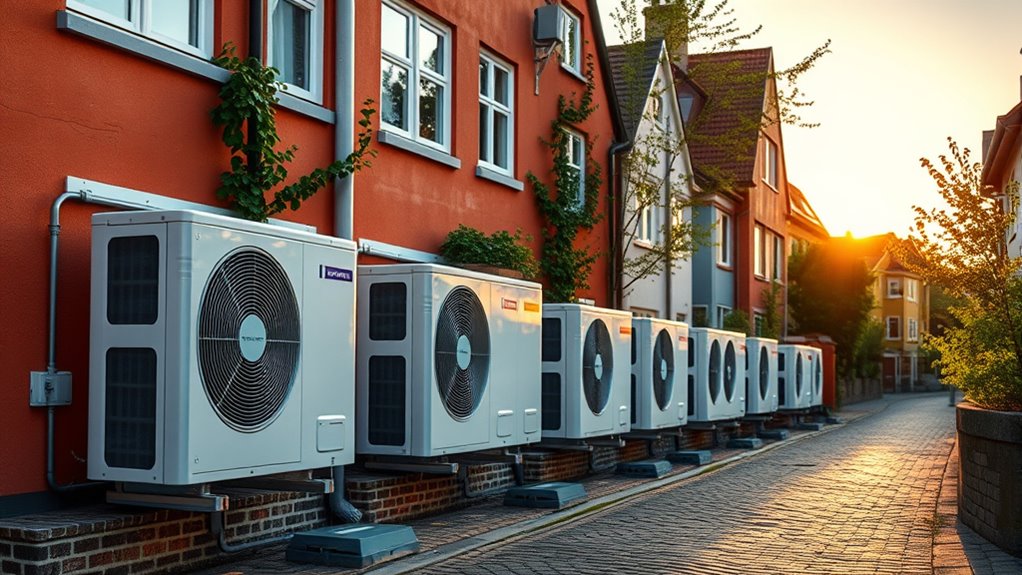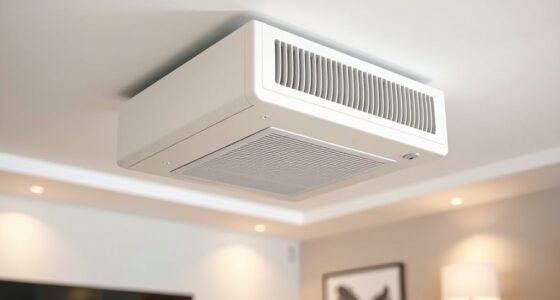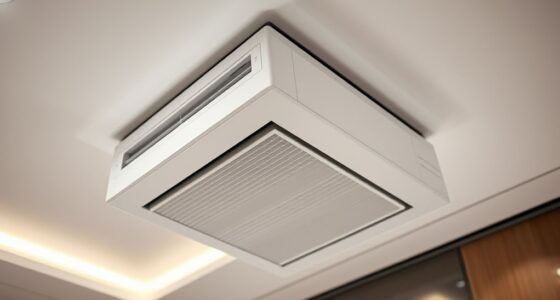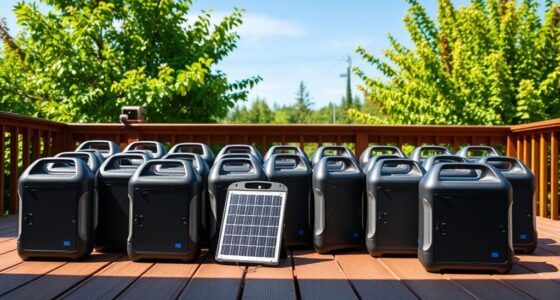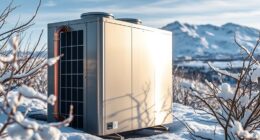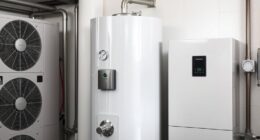To support your heat pump installation, the EU offers various financial incentives like grants, tax credits, rebates, and low-interest loans across member states. Countries like Germany, France, Italy, and Spain have tailored schemes to reduce upfront costs and boost renewable heating adoption. Local authorities also run programs and awareness campaigns to encourage buyers. If you’d like to know how these incentives work and how to apply, there’s more to discover below.
Key Takeaways
- The EU offers various incentives like grants, tax credits, rebates, and low-interest loans to promote heat pump adoption.
- National programs in countries such as Germany, France, Italy, and Spain provide specific financial support and streamlined application processes.
- Incentives often require compliance with energy efficiency standards, recent upgrades, and certified installation procedures.
- Proper documentation and eligibility verification are essential to maximize financial benefits from available schemes.
- Addressing application challenges and increasing public awareness are key to boosting heat pump market growth across the EU.
Overview of EU Climate Goals and Heating Sector Decarbonization
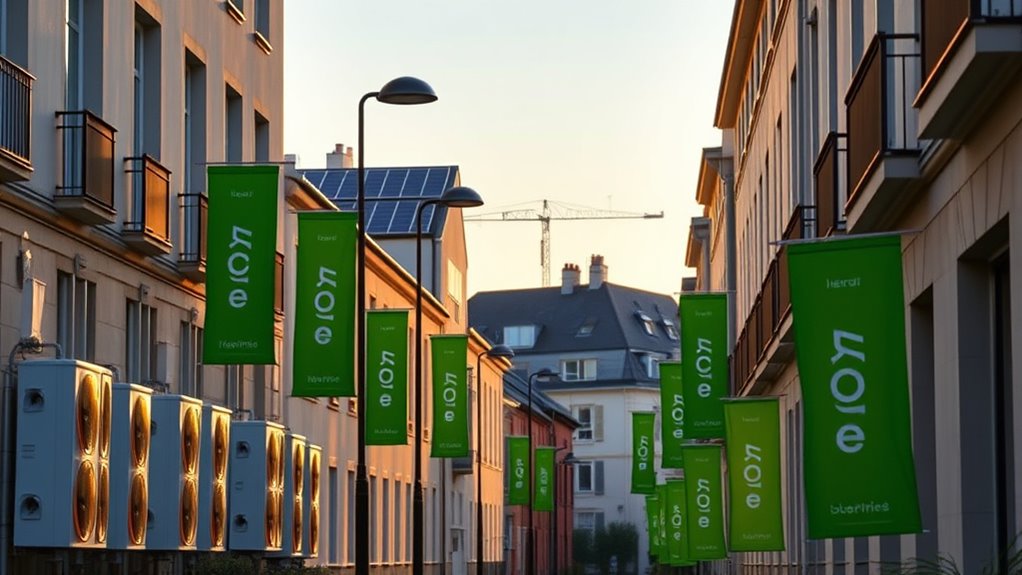
The EU has committed to achieving climate neutrality by 2050, setting ambitious targets to reduce greenhouse gas emissions across all sectors. To meet these goals, the focus is on renewable integration within the energy system, emphasizing cleaner energy sources like wind and solar. As a consumer, your behavior plays a pivotal role in this transition; your choices influence demand patterns and support the shift to sustainable heating solutions. Decarbonizing the heating sector involves replacing fossil fuels with renewable energy, and your adoption of heat pumps aligns with this effort. By embracing renewable integration and adjusting your consumption habits, you contribute directly to the EU’s climate objectives and help accelerate the move towards a low-carbon future. Renewable energy adoption also promotes economic growth through job creation in manufacturing, installation, and maintenance sectors.
Types of Financial Incentives Available Across Member States
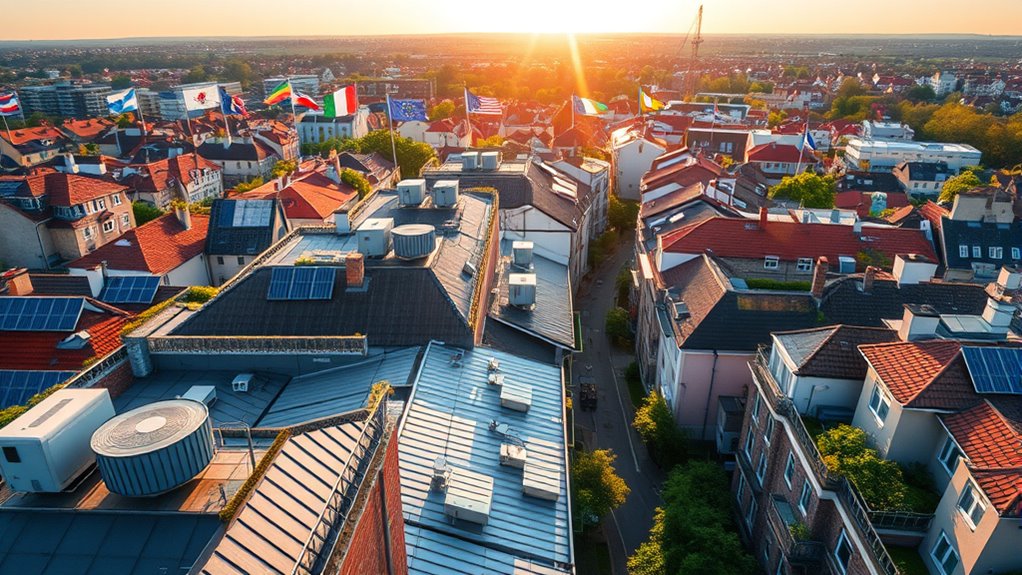
Across EU member states, a variety of financial incentives encourage homeowners and businesses to adopt heat pumps. These incentives aim to boost renewable energy use and support policy incentives aligned with climate goals. You might find direct grants that reduce upfront costs, making heat pump installation more affordable. Tax credits are also common, offering ongoing savings for renewable energy investments. Additionally, some countries provide low-interest loans or rebates to promote heat pump adoption, aligning financial support with policy incentives to decarbonize heating. These approaches help accelerate the transition to cleaner energy sources, making heat pumps more accessible and appealing across the EU. Understanding the types of incentives available can help you maximize financial benefits while supporting sustainability goals.
Germany’s Heat Pump Subsidy Program
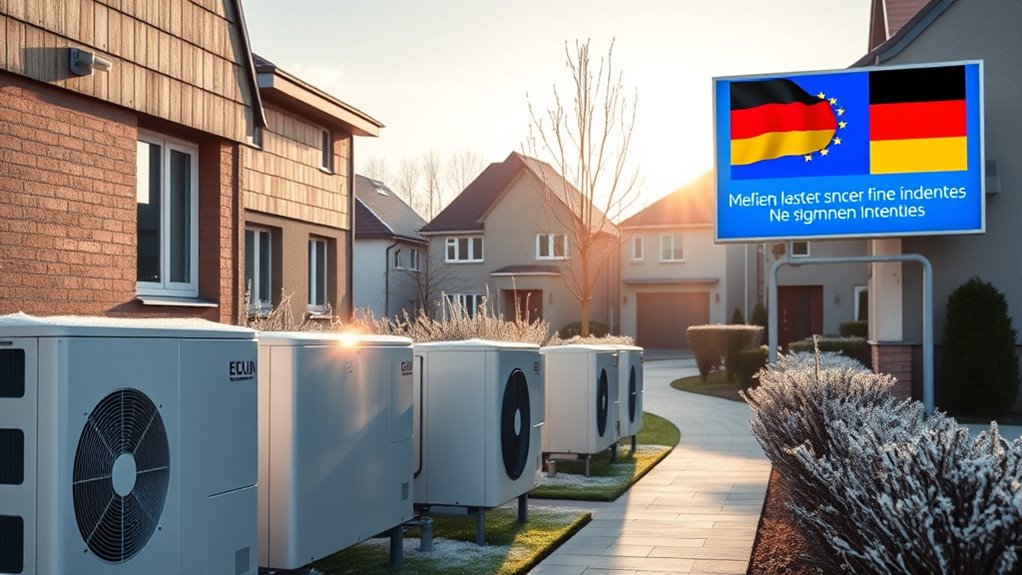
Germany’s heat pump subsidy program offers clear funding eligibility criteria that you need to meet. The application process is straightforward, with specific steps to follow to secure your subsidy. Understanding these points helps you navigate the program effectively and maximize your benefits. Additionally, reviewing best energy-efficient appliances can further enhance your home’s efficiency and savings. Since adopting energy-efficient appliances like heat pumps can contribute to long-term cost savings, it’s beneficial to consider their nutritional value of juices as part of your overall energy strategy. Incorporating renewable energy sources into your home can also support more sustainable heating solutions and increase your eligibility for incentives. Being aware of energy savings potential can help you make more informed decisions about implementing these systems. Recognizing the importance of ice cream consumption patterns can also provide insights into seasonal energy use fluctuations, helping optimize heating during colder months.
Funding Eligibility Criteria
To qualify for the heat pump subsidy program, you must meet specific eligibility criteria set by the government. These criteria ensure that technological advancements are utilized effectively, and consumer awareness is prioritized. You should own a property that meets energy efficiency standards and has undergone recent upgrades. Additionally, your heat pump must be from approved models that incorporate the latest technological advancements for better performance. The government also emphasizes the importance of consumer awareness, so proof of proper installation and maintenance may be required. Overall, these criteria help target eligible applicants who are committed to sustainable energy solutions and support the program’s goal of increasing heat pump adoption across Germany. Furthermore, understanding the personality traits of consumers can enhance outreach and education efforts to boost adoption rates. Recognizing the importance of market volatility in consumer decision-making can also aid in designing effective incentive programs. Ensuring compliance with environmental considerations, such as sustainable practices, can further strengthen eligibility and promote ecological responsibility. Additionally, clear communication of product lifespan and maintenance requirements can motivate consumers to choose reliable, long-lasting heat pump systems. Being aware of regulatory compliance requirements can help applicants avoid potential legal or procedural issues during application and installation.
Application Process Overview
Once you’ve confirmed that your property meets the eligibility criteria, you can begin the application process for Germany’s heat pump subsidy program. Start by conducting a thorough cost benefit analysis to guarantee the investment makes sense. Next, gather all necessary documents, including proof of property ownership and energy assessments. You’ll need to choose an installer that meets specific requirements set by the program, ensuring they are certified and experienced with heat pump installations. Submit your application through the designated online portal or designated authorities, providing all supporting documentation. After approval, coordinate with your installer to complete the installation within the specified timeframe. Following installation, you may need to submit proof of completion for your subsidy claim. The process is streamlined but requires attention to detail and compliance with installer requirements. Ensuring proper system sizing and installation is crucial for maximizing efficiency and long-term savings. Additionally, understanding the application procedures and adhering to local regulations can help prevent delays and ensure smooth processing.
France’s Tax Credits and Rebates for Renewable Heating

France offers attractive tax credits and rebates to encourage renewable heating, making it easier for you to upgrade your system. You can benefit from specific tax incentives, which often require you to follow a straightforward application process. Understanding these details helps you maximize your savings and guarantee a smooth claim experience.
France’s Tax Credit Details
Are you aware of the financial incentives available for installing renewable heating systems in France? The country offers attractive tax credits that encourage renewable integration and improve energy efficiency. These incentives can markedly reduce upfront costs while supporting sustainable heating solutions. Vetted – Startup Sofa Furthermore, these programs are designed to promote eco-friendly technology adoption among residents and businesses alike. Additionally, implementing these measures enhances AI security by safeguarding data associated with energy management systems, ensuring compliance with regulations and boosting overall trust in renewable technologies. Recognizing the popularity of preppy dog names, some of these themes inspire the naming conventions for eco-friendly initiatives, emphasizing style and sophistication. Incorporating advanced smart technology in renewable heating systems can further optimize energy savings and user control, demonstrating the importance of creative practice in developing innovative solutions for sustainable living.
Rebate Application Process
Applying for France’s tax credits and rebates for renewable heating is a straightforward process, but it requires careful preparation. The rebate process involves several application steps you need to follow precisely. First, gather all necessary documents, such as proof of purchase, installation receipts, and certification of the heat pump’s energy efficiency. Next, complete the official application form, either online or in paper form, depending on the program. Submit your application along with the required documents to the designated authority. Once your application is reviewed and approved, you’ll receive the rebate or tax credit, usually via bank transfer or direct deduction. Staying organized and adhering to deadlines ensures a smooth application process and maximizes your chances of securing the incentives.
Italy’s National Incentive Schemes for Heat Pump Installation

Italy has implemented a series of national incentive schemes aimed at encouraging the adoption of heat pumps, making it more affordable for homeowners and businesses to upgrade their heating systems. These programs focus on promoting technology integration and increasing consumer awareness about energy efficiency benefits. By offering financial support, Italy aims to accelerate heat pump adoption and reduce reliance on fossil fuels. The schemes include tax credits, grants, and simplified application processes to make participation straightforward. They also emphasize educating consumers on the advantages of heat pumps and how they fit into Italy’s broader climate goals. You’ll find these incentives help offset installation costs, making eco-friendly heating solutions accessible for more people. Overall, Italy’s approach fosters a supportive environment for heat pump growth and sustainable technology adoption.
Spain’s Support Programs and Funding Opportunities
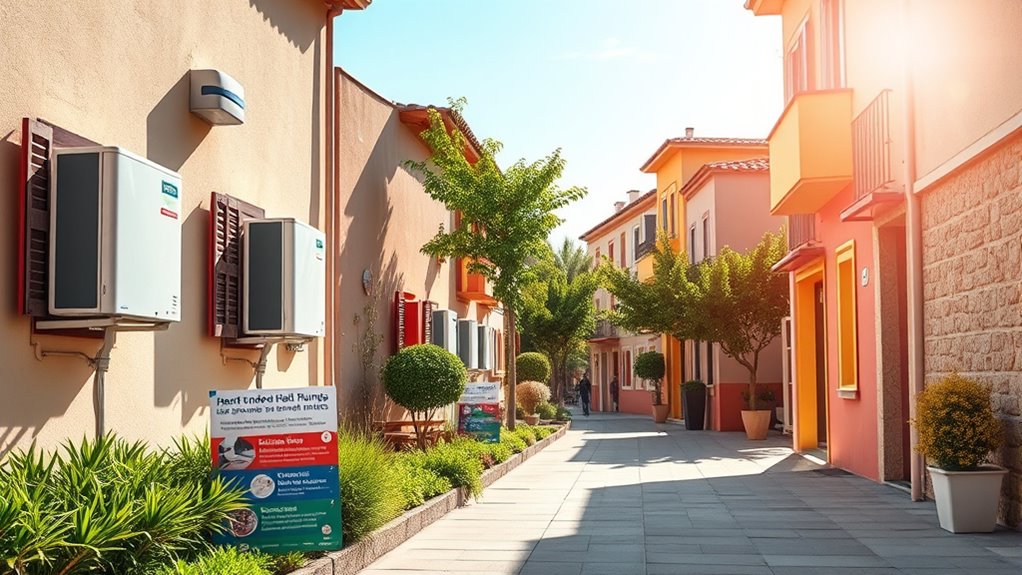
Spain has launched a variety of support programs and funding opportunities to promote heat pump adoption across the country. These initiatives aim to enhance energy efficiency and facilitate renewable integration in residential and commercial buildings. Funding options include grants, tax incentives, and low-interest loans, making heat pumps more accessible. These programs target both new installations and upgrades, encouraging widespread adoption. By participating, you can reduce energy consumption and improve your building’s sustainability. The table below summarizes key programs:
| Program Name | Main Focus |
|---|---|
| Renovation Support Fund | Energy efficiency upgrades |
| Renewable Incentives | Promoting renewable integration |
| Tax Benefits | Financial relief for upgrades |
| Low-Interest Loans | Affordable financing options |
These opportunities help you leverage funding effectively, advancing Spain’s renewable goals.
The Role of Local Authorities in Promoting Heat Pumps

Local authorities play a crucial role in accelerating heat pump adoption by designing policies, providing incentives, and leading awareness campaigns. Your municipal engagement can considerably influence community uptake of energy-efficient solutions. Through initiatives like local funding programs, you can reduce financial barriers for residents and businesses.
Consider these approaches:
- Implementing municipal grants or subsidies to support heat pump installations
- Promoting awareness campaigns to inform residents about benefits and available incentives
- Partnering with local organizations to expand outreach and education efforts
Eligibility Criteria and Application Processes for Incentives
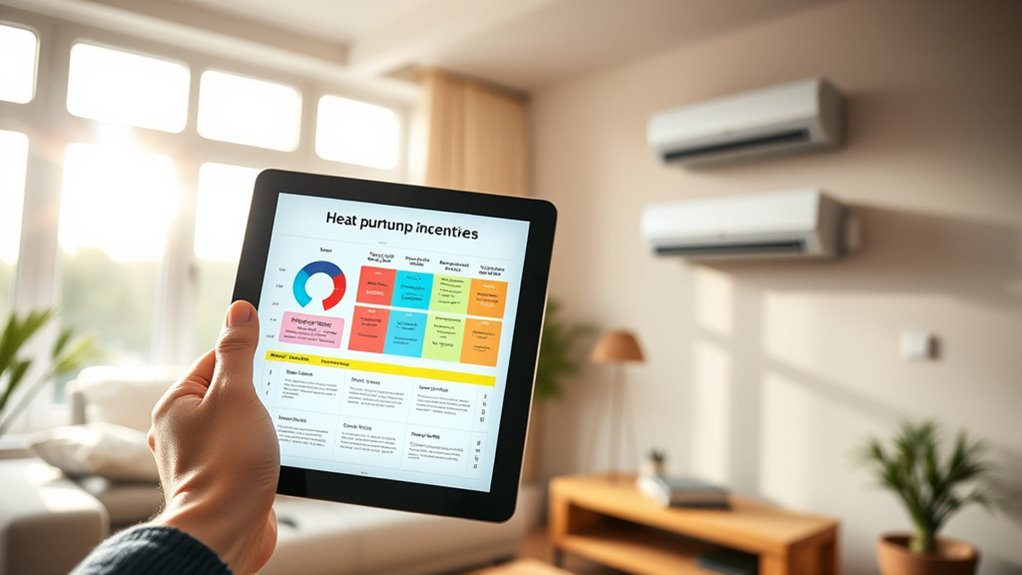
To access financial incentives for heat pumps, you need to understand the qualification requirements, which vary by program. Once you meet the criteria, you’ll follow specific steps to submit your application. Knowing these processes upfront helps make certain a smooth and successful claim.
Qualification Requirements Overview
Understanding the qualification requirements is vital for successfully accessing heat pump incentives in the EU. These criteria guarantee you meet the standards set for technological advancements and consumer awareness initiatives. Typically, you’ll need to verify that your heat pump meets efficiency and sustainability benchmarks. Additionally, your property might need specific insulation or energy performance ratings to qualify. Some programs require proof of recent upgrades or certifications to demonstrate technological advancements. Consumer awareness campaigns also influence eligibility, encouraging applicants to participate in educational activities. To navigate this process smoothly, review the specific criteria set by your local authority or incentive program. Meeting these requirements is imperative for securing financial support and maximizing the benefits of adopting a heat pump system.
Application Submission Procedures
Once you’ve confirmed that your heat pump meets the qualification requirements, the next step is to navigate the application submission process. You’ll need to gather documentation proving technological feasibility, such as installation certificates and technical specifications. Be aware that many programs require proof that your system meets efficiency standards. Consumer awareness plays a role here, as understanding the application steps helps streamline your submission. Verify your application is complete and accurate to avoid delays. Some incentives may require online submissions, while others accept paper forms. Check eligibility criteria carefully, including property ownership and installation date restrictions. Following these procedures precisely increases your chances of securing financial support and simplifies the process, allowing you to benefit from the incentives more quickly.
Impact of Financial Incentives on Heat Pump Market Growth
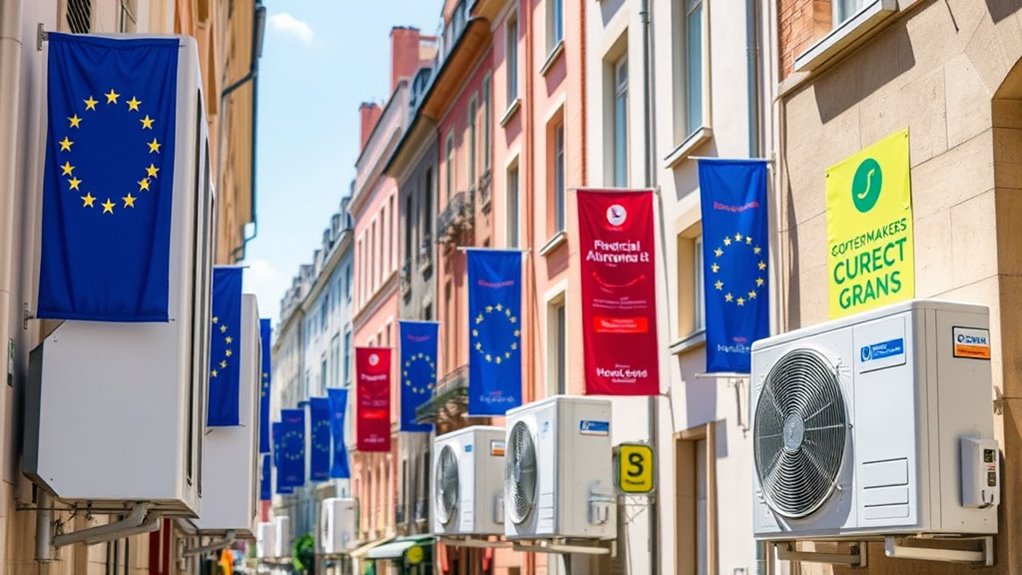
Financial incentives have proven to be a powerful driver of heat pump market growth across the EU. They help overcome market barriers like high upfront costs and limited consumer awareness, making heat pumps more accessible. When incentives are available, more consumers consider installing heat pumps, boosting demand and market expansion. These programs also encourage manufacturers to innovate and lower prices over time.
- Incentives reduce the financial risk for consumers, increasing adoption rates.
- They raise awareness about heat pump benefits, addressing knowledge gaps.
- Market growth accelerates as more households and businesses switch to sustainable heating solutions.
Challenges and Future Outlook for Incentive Programs

Despite their successes, incentive programs face significant challenges that could hinder their long-term effectiveness. Market barriers, such as high upfront costs and limited consumer awareness, slow adoption despite financial support. Additionally, inconsistent policy reform across EU countries creates uncertainty, making it harder for programs to sustain momentum. To overcome these issues, policymakers must prioritize targeted reforms that address these barriers directly, such as streamlining application processes and expanding public education efforts. Future outlook depends on coordinated efforts to refine incentive schemes, ensuring that they remain attractive and accessible. Strengthening policy alignment across member states will be *vital* for scaling heat pump adoption and achieving long-term climate goals. Without addressing these challenges, the potential of financial incentives risks being undercut.
Frequently Asked Questions
How Do Financial Incentives Vary Between Different EU Countries?
You’ll find that financial incentives differ across EU countries, reflecting regional disparities and cultural acceptance of heat pumps. Some nations offer generous rebates or tax credits, encouraging adoption, while others provide limited support. Your experience may vary depending on where you live, as local policies and attitudes toward renewable energy shape the incentives. This uneven landscape influences how quickly and widely heat pumps are embraced across the EU.
What Are Common Eligibility Requirements for Heat Pump Subsidies?
Think of eligibility criteria as the key to opening subsidies, much like a secret password. You usually need to own your property, meet energy efficiency standards, and guarantee the heat pump’s type and capacity qualify. The application process often involves submitting proof of ownership, an assessment of your home’s energy needs, and completing forms online or in person. Meeting these criteria is essential to secure your heat pump subsidy smoothly.
How Do Incentive Programs Influence Consumer Decisions on Heat Pump Adoption?
You’re likely influenced by incentive programs because they help overcome behavioral barriers and boost market awareness. When you see financial incentives, it becomes easier to justify the upfront costs of a heat pump, making you more confident in adopting sustainable technology. These programs also increase your awareness of benefits, encouraging quicker decisions and reducing hesitation, ultimately making heat pump adoption more appealing and accessible for consumers like you.
Are There Any Restrictions on the Types of Heat Pumps Eligible for Incentives?
Think of incentives as a golden ticket, but even they have rules. You’ll find that technology restrictions and efficiency standards are in place, meaning only certain heat pump types qualify. Some programs exclude older or less efficient models, ensuring you get the best bang for your buck. So, check the specific criteria, because not every heat pump makes the cut, but the right one can release great benefits.
What Is the Timeline for Applying and Receiving Financial Support?
You need to check the specific application deadlines for each program, as they vary by country and funding period. Typically, you’ll submit your application during the designated funding periods, which can be open for a limited time each year. Once you apply, it may take several weeks or months to receive support, so it’s best to plan ahead and stay updated on deadlines to guarantee your application is timely.
Conclusion
If you don’t jump on the heat pump bandwagon now, you’ll miss out on a revolution that’s transforming Europe’s heating landscape—faster than you can say “climate action!” With massive subsidies, tax credits, and local incentives, the EU is making heat pumps so affordable, you’ll wonder why you didn’t upgrade sooner. Don’t get left behind in the cold—embrace the future of sustainable heating before these incentives disappear!
